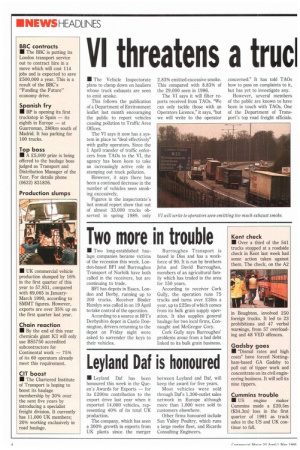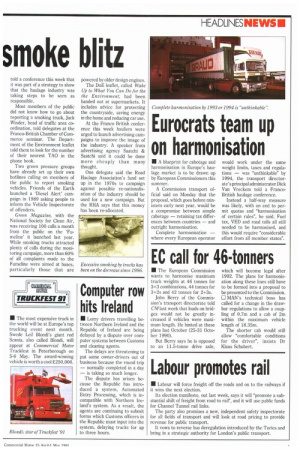VI threatens a trucl smoke blitz
Page 6

Page 7

If you've noticed an error in this article please click here to report it so we can fix it.
• The Vehicle Inspectorate plans to clamp down on hauliers whose truck exhausts are seen to emit smoke.
This follows the publication of a Department of Environment leaflet last month encouraging the public to report vehicles causing pollution to Traffic Area Offices.
The VI says it now has a system in place to "deal effectively" with guilty operators. Since the 1 April transfer of traffic enforcers from TAOs to the VI, the agency has been keen to take an increasingly active role in stamping out truck pollution.
However, it says there has been a continued decrease in the number of vehicles seen smoking excessively.
Figures in the inspectorate's last annual report show that out of almost 33,000 trucks observed in spring 1989, only 2.83% emitted excessive smoke, This compared with 8.83% of the 29,000 seen in 1986.
The VI says it will filter reports received from TAOs. "We can only tackle those with an Operators Licence," it says, "but we will write to the operator concerned." It has told TAOs how to pass on complaints to it, but has yet to investigate any.
However, several members of the public are known to have been in touch with TAOs. One of the Department of Transport's top road freight officials. told a conference this week that it was part of a strategy to show that the haulage industry was taking steps to be seen as responsible.
Most members of the public did not know how to go about reporting a smoking truck, Jack Winder, head of traffic area coordination, told delegates at the Franco-British Chamber of Commerce seminar. The Department of the Environment leaflet told them to look for the number of their nearest TAO in the phone book.
Two green pressure groups have already set up their own hotlines calling on members of the public to report smoking vehicles. Friends of the Earth launched a 'Diesel Alert' campaign in 1989 asking people to inform the Vehicle Inspectorate of offenders.
Green Magazine, with the National Society for Clean Air, was receiving 100 calls a month from the public on the 'Fumeline' it launched last year. While smoking trucks attracted plenty of calls during the monitoring campaign, more than 60% of all complaints made to the Fumeline were aimed at buses, particularly those that are powered by older design engines.
The DoE leaflet, called Wake Up to What You Can Do for the the Environment, had been handed out at supermarkets. It includes advice for protecting the countryside, saving energy in the home and reducing car use.
At the Franco British conference this week hauliers were urged to launch advertising campaigns to improve the image of the industry. A speaker from advertising agency Saatchi & Saatchi said it could be done more cheaply than many thought.
One delegate said the Road Haulage Association's fund set up in the 1970s to campaign against possible re-nationalisation of the industry should be used for a new campaign. But the RHA says that this money has been re-allocated.
























































































































